It’s Time To Change The Way We View And Treat Neutering
I admit that when it comes to many subjects concerning dogs I become a pretty serious guy. Especially those controversial ones such as the best methods of training. As far as neutering dogs is concerned though, I feel equally as strong. My personal opinion as someone who is well-versed on canine health and having had dogs my whole life I think it’s high time we stop seeing neutering as a moral decision and start seeing it as a pragmatic one made from an objective standpoint.
Because there’s no room for emotion when it comes to your dogs health-only scientific facts and real-world examples of what other dog owners are actually experiencing. The time to stop being guilt tripped into cleansing your dog of those ‘extra (perhaps dirty) parts’ of their body as a routine procedure and start to pay attention to the health consequences of neutering is now. That time to stop treating the supermassive, life-altering (for your dog) decision to neuter as such an unimportant thing not worthy of any thought or consideration is now.
There are smart owners out there who know of the potential issues and will do it anyway without sufficient reason which is sad. And it’s not fair on the dogs. But owners are not totally to blame. They’re often shamed into neutering by vets and other owners. Maybe you are or have been one of them? I admit I have. This shaming is still prevalent (in America especially) and is responsible for societal conditioning of regarding dogs as sexless animals and needing to be ‘fixed’ (for no good reason) if they are not already. I get it. Your often sold on the advice that spay and neuter is healthier but (less face it) with little scientific evidence to back up the claims of these so-called benefits.
No vet who routinely pushes neutering is going to steer you in the direction of the research that reveals the truth that neutering CAN AND DOES have serious health implications, both physical and behavioural,(which they don’t tell you about) preferring to keep plugging the commonly touted fact that neutering prevents horrific reproductive cancers (it does but they aren’t a major threat in the majority of dogs-keep reading). However the nastiest lie dog owners are sold is that it’s blanket cure for behavioural issues and that it actually increases your dog’s quality of life. Why would vets advise any different when the majority of them don’t know any better? Well there really is research on neutering that’s been available since the early noughties-yes really! I would bet that you’ve never looked into it though. But it would make you think twice about when to neuter your dog or whether it’s best to do it at all.
Getting To Grips With…Facts!
The infographic above reveals a contradictory picture that neutering prevents certain cancers as well as cause them. Crazy right? Upsetting too if this is news to you. This as well as a whole host of other health implications. Part of the problem is that people have been conditioned to erroneously think that sex hormones (testosterone and oestrogen) in pet dogs are responsible for nothing more than sexual behaviour and reproduction when in fact the healthy and normal functioning of the entire organism that is the physical body is dependent on these major hormones being present. So to say sex hormones serve a purpose that’s so much more is an understatement. Let me elaborate. The major body systems in mammals depend directly upon sex hormones which translates as good bone health, normal endocrine functioning and normal immune functioning. Without these major players serious terminal diseases such as cancers and metabolic illnesses arise. This study focuses on the important relationship between the hypothalamus and sex hormones and how and why cancers develop in neutered dogs.
The Sad Case Of Early Neutering
Over here in blighty it’s been the thing to neuter puppies at 6 months of age for a long time. In the US it’s worse because the neutering of puppies is sometimes done from 7 weeks if we’re talking about rescue/shelter dogs. Why is this a problem? More research is coming into the public’s mind (although at a snail’s pace I think) that paediatric neutering (what we call neutering before puberty) in medium to giant breed dogs is the direct cause of horrible health problems such as orthopaedic issues and bone cancers at worst due to abnormal bone growth. But small breeds are not free of this. It’s just the larger breeds tend to suffer more because they are, well, larger.
So, a bit of science here. Let’s start with the skeletal system. Puppies have open growth plates from which bones grow and these plates only close when it’s time for every bone that makes up the entire skeletal system to stop growing and that is between 3 months up to 18 months in all breeds. The female sex hormone oestrogen is responsible for signalling to the plates to close and obviously if it’s removed through neutering puppies at any point before 18 months, some of the plates will not have closed and the bones will continue to grow for longer. By the way the human body develops in the same way (yes, really). So some bones will grow out of proportion to the rest of the skeletal system resulting in early neutered dogs appearing taller or ‘uneven’ and this poor growth pattern can cause more problems than just poor aesthetics. The research shows that dogs suffer from crippling orthopaedic issues such as hip dysplasia and cruciate ligament tears often result and the larger the breed, the worse the outcome. Small breeds such as Min Pins are at much higher risk of patellar luxation-a condition common to the breed-when neutered (study shows a more than threefold risk).
Neutering at any age before 18 months cuts off the supply of oestrogen which in turn will leave your puppy’s orthopaedic system in danger. Next up is an issue unique to bitches. Urinary incontinence and UTI’s. Before a female puppy has her first season her vulva is undeveloped and ‘child-size’. However, her first season will completely transform this and will put her private parts through rapid maturity. When she’s spayed (neutered) before her first season, this transformation can’t occur and the rest of her body will transition into adulthood while her private parts remain at an insufficient size. This can cause infections because bacteria builds up inside the hood of an immature vulva. As oestrogen is in part responsible for bladder control spaying can increase the incidence of urinary incontinence. Therefore it’s possible that the presence of this hormone plays a role in spayed female puppies who have ‘house training problems’ and the ones that aren’t spayed have any house training problems magically cease after their first season (I know of friends and many dog people who’ve first-hand experience of this).
It’s also worth noting that neutered dogs have a higher incidence of cancerous prostate tumours.
Is That A Dog Or A Potato?
Sadly it’s more often than not a potato. That’s because on the whole neutering is the single biggest cause of the overweight pet population in the Western world. This fact has long been downplayed by vets and popular culture. A lot pet dog and cat advice will simply tell you neutering doesn’t make your pet fat but that adjusting their calorie intake is recommended. A simple statement full of contradiction. Does it or doesn’t it make your dog fat? The worst thing is that vets will not advise properly or practically and won’t ram home the importance of feeding your neutered dog correctly due to the massive changes in their metabolic system. Instead they’ll leave you hanging. And owners are in need of all the help they can get because adjusting their dog’s diet is easier said than done and often owners have a lack of discipline when it comes to feeding.
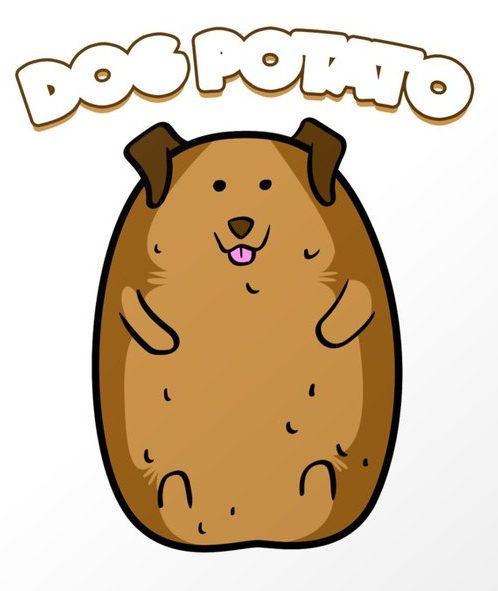
Credit: society6.com
The absence of sex hormones due to neutering at any age means that the metabolic rate slows right down leading to reduced efficiency in calorie burning and the special hormones responsible for feeling full and satiated now don’t do their job properly leading the dog to eat more. This is because the interdependent hormonal system is thrown into disrepute. Quick example. Owners who are on the whole already terrible at portioning out their dog’s food would need to reduce their dog’s caloric intake by a whole 30% less than then the requirements for an intact dog when they get them neutered, to sustain a healthy weight. The problem is a neutered dog would feel on average even more hungry with this reduction due to disrupted hormonal to brain signals and will attempt to beg his owner for more food. Coupled with a lack of control from owners this is partly why neutered dogs are on average overweight. The second reason is the removal of sex hormones means reduced willingness to exercise and explore. Both diet and exercise is something that can be managed correctly but most owners of neutered dogs don’t know this or don’t do it.
Have You Been Dragged Through A Hedge Backwards?!
Ever heard of ‘spay coat’? Neutering changes your dog’s coat for good although the differences between individuals vary greatly. Oestrogen is in part responsible for the upkeep of a healthy coat and the removal of it results in a dry, woolly or fluffy appearance for both sexes. And while far more noticeable and worse in long-haired breeds, short-haired breeds also suffer with a poor coat leading it to become dry because it loses some of it’s natural oils. With long-haired coats their ability to shed dirt is inhibited when the dog is neutered resulting in a dirty and unkempt look which matts easily. This is because it becomes difficult for the owner to manage. Another reason long-haired breeds destined for the show ring such as Irish Setters are left intact.
I Don’t Want My Shots!
It’s been talked about amongst the dog-owning community for a good few years now, my circles included, where some people I know have had first-hand experiences with adverse reactions to vaccinations. There’s now some scientific evidence to show that neutered dogs do indeed have an increased risk of reactions especially if they are young, small breeds. I personally would love to see more research done on this because we need it. This potential issue is definitely something for Min Pin owners to consider.
An Interdependent System And It’s Constant Need For Balance
So why does the removal of sex hormones cause all these issues? As the diagram above illustrates the endocrine system is made up of several parts. The pituitary gland, thyroid gland, parathyroid gland, pancreas, adrenal glands testicles and ovaries. The system works as a messenger system because the primary glands which are all completely interdependent on one another that make the hormones, are continually talking to one another in a complex interplay to ensure there is consistent hormonal balance resulting in normal functioning of the body for optimal health. Make sense? Remove one of the main players and you’re gonna have problems.
Given this information it’s easier to see why neutering has such dire consequences on the health of the canine organism as once one of the primary components of the system are removed through neutering the system becomes loses it’s balance. Thus everything in the body suffers leading to the potential conditions already mentioned. The body will attempt to desperately allocate the job of sex hormone production to other glands which is extremely taxing on them as they are taking on extra work. Eventually the consequences of the resulting endocrine disorders can lead to illness and diseases at any age. Remember the physical body works as a system with all parts reliant on one another.
In general neutering reduces trainability contrary to popular belief. Many working dogs in professional and non-professional settings are left intact for a reason because hormones help with focus and drive. Testosterone and oestrogen play a vital role in the many aspects of cognitive function and the protection of cognitive decline in humans and dogs. This means that the decline in brain power and associated abilities is common in neutered dogs
Another popular belief that vets push time and again is that neutered dogs ‘live longer’. A blanket statement but what the hell does it mean? Never mind because they don’t. As you can see the studies show that the potential health issues that result from a life-changing decision that you make for your dog. One of the studies responsible for this untruth found that the longer life was due to not roaming for sexual reasons and the getting into an accident, fights and so on. But the average owner does not allow their dog to roam so this isn’t applicable
So Are There Any Benefits To Neutering?
Yes there are! But as you know that understanding the benefits requires some critical thinking on your part and that taking whatever a vet says as gospel will not help you or your dog. Part of this is weighing up the pros and the cons for your unique situation and balancing the most probable risks with the not so probable risks. I always say to owners who ask for my opinion that neutering should only ever be considered IF there is a good reason for doing it. That means every owner’s circumstances are different including their breed of dog (overall risks tend to increase with increased breed size), it’s own lineage and genetic pre-disposure to disease as well as individual personality and temperament which I discuss below. Ensure that your dog is receiving maximum benefit from neutering before you schedule in the operation by researching thoroughly and speaking to an open-minded vet. Please, please, please know that neutering should not be done pre-emptively. Ever. And don’t fall into that trap.
Dogs Vs Bitches
Different considerations have to made here. The important thing is to ensure that you understand the real picture and not get consumed by fearful statements from vets. Pyometra is an infection of the uterus that bitches are at risk of if they go through their lives without breeding. Each heat cycle (season) she has increases her risk HOWEVER this risk varies massively by breed. Vets don’t tell you this. The Min Pin was one of the 110 breeds least likely to develop pyometra by the age of 10 years old in a Swedish study. Spaying will of course prevent this but I’ll mention what you can do for your bitch below to avoid it and still keep her safe.
Spaying will decrease mammary cancer which is usually seen in senior dogs. Understand that these tumours are usually benign (more than 50%) and that spaying will promote non-reproductive cancers-more facts that vets leave out. Cancerous mammary tumours have a very high cure rate if caught within the first 6 months of discovery which means that you can easily do daily examinations yourself to become familiar with your bitch’s teats so you’ll be able to detect changes. Mammary cancer also varies greatly from breed to breed and again the Min Pin is less likely to develop it.
The incidence of ovarian cancer is extremely rare in bitches so it’s hardly worth mentioning. Same for uterine cancer. Certainly not as a reason to spay.
Castration is widely thought by vets to prevent prostate tumours however the caveat to this is they are mostly benign and cancerous ones are extremely rare. Intact males have a higher incidence of non-cancerous tumours and enlargement of the prostate which is not life threatening. Not all prostate enlargement is hormonally related though and in the case that it’s due to something else neutering will not help.
Castration at any age can prevent a dog’s desire to life his leg and mark in the house or in general which is a sex-related behaviour separate from urinating because of improper toilet training or anxiety issues.
Intact males who obsessively hump intact bitches and become problematic (e.g. stop eating, whining) when they encounter bitches in season can be cured through neutering. However this is only a benefit if you have intact dogs of both sexes at home.
Testicular cancer shows up in older dogs of 10 years and above BUT dogs with cryptorchidism (an undescended testicle) account for a high percentage of all testicular tumours. Testicular cancer in non crypto dogs is almost NEVER fatal and has a very high cure rate if caught in time. Again a quick daily examination is all it takes.
Credit: shoppuppyculture.com
Neutering Is NOT A Magic Cure Guys! Please!
The team at Heathside have let visitors in on some popular statements about neutering which you can see here. But I’ll go through some I hear on a regular basis. Neutering will ONLY stop behaviours related to reproduction only e.g. roaming or urine marking in both sexes. Understandably not what you’d like your pet to be doing. However people tend to think that neutering is a magic cure or preventative for behavioural problems. When in fact it does not stop practically all behavioural complaints from owners because these behaviours are almost always non-sexually driven. Examples are all types of aggression directed at humans e.g. food and resource guarding and most aggression directed at other dogs e.g. fear and reactivity. Common undesirable behaviours that owners think neutering will cure is general humping, urinating in the house (because they confuse it with urine marking) and poor trainability. As a matter of fact it is reported that neutering can worsen these behaviours.
Emerging research has shown that aggression is INCREASED after neutering in both sexes which could be caused by an increase in fear and anxiety in general leading to reactivity in dogs, a springboard for several bad behaviours. Going back to the endocrine system the absence of the ‘loving and relaxing’ hormone oestrogen is the possible cause. This is because when it’s present it does promote bonding in dogs of both sexes and mental stability. Testosterone on the other hand strengthens confidence in males and related behaviours such as highly energetic boisterous interactions with other dogs. Think about it. If a fear-aggressive, reactive neuter has to deal with such an intact male on a walk what do you think could happen? If you consider the large proportion of neutered dogs these interactions could be a real problem (just as well dogs have to be neutered before being allowed into day care eh?😜😜).
Amongst these neutering-related behaviours are general timidity, increased fear of noises/sounds and phobias, excitability and biting through fear. Neutering can be a direct cause of fear and reactivity but it’s just as likely that neutering made an existing problem worse especially if this is a dog’s natural disposition. This study is one of many that shows although certain types of reactivity such as to boredom or separation anxiety can be augmented by oestrogen in bitches (which spaying may reduce or stop) serious undesirable behavioural issues were increased with spaying particularly at an early age.
This brings me to my next point. Neutered males tend to ‘hate’ intact males and often snap at them and want to fight during meetings on walks whereas amongst one another, neutered males are okay. Although research looking into the behavioural consequences after neutering male dogs is scarce this is something I’ve personally observed time and again. Unless neutered dogs have had previous bad experiences with intact dogs, I believe the fear-aggression could be because they smell different or it could be they’ve been around only neuters their whole lives. Intact males don’t seem to display the same contempt for neutered dogs.
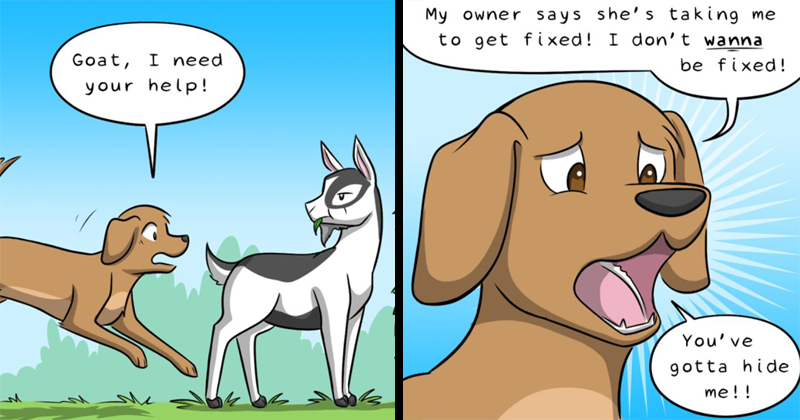
Credit: KatRaccoon Comics
Leaving Your Pooch As Nature Intended
Isn’t it better for your dog to have a higher quality of life than one plagued by the strong possibilities of neuter-related diseases and worsening behavioural issues? I get it. What I’ve brought to your attention in this post is confusing if you had no prior knowledge on the subject. But in many ways neutering can be like a game of roulette. One I wouldn’t chance as my knowledge into the subject has deepened. Often the reasons for owners making dogs undergo such a risky practice are obsolete born out of wrongful and insufficient information. I find that quite scary. Having said that, living with an intact pooch needn’t be any more difficult than having a neutered one. Here are some tips.
SOME intact males may enjoy lifting their leg and marking more than others. In the unfortunate event that your male is one of them belly bands are an absolute lifesaver. An excellent way to manage your intact male’s marking behaviour.
Heat cycles/seasons aren’t as scary and unmanageable as people are scared into thinking by vets and popular opinion. Bitches keep themselves clean during their week of bleeding and simple hygiene pants will keep her from messing up your soft furnishings. The messes are pretty minimal and not as bad as they’re made out to be. I’ve been through tons of heat cycles with my own dogs and will do a post about it soon.
You may want to consider an ovary-sparing spay like my Poppy has instead of a traditional one. This operation removes your bitches uterus preventing the risk of pyometra but leaves her ovaries allowing her to have healthy and normal hormonal function without the risk of ever becoming pregnant. She won’t have seasons fully which means no mess (only the behaviours will continue). We have only found one vet in the UK that offers this operation and they can be found here. If it’s not convenient for you for any reason then you may want to consider spaying but remember to stick to the recommended age
Some intact males do posture and show dominance towards other intact males but this doesn’t necessarily mean a fight will follow. Most of the time these issues are due to improper socialisation or exposure (or a break in either one) to other intact males (since most dogs are neutered). I recommend you make sure your intact male is consistently socialised with other dogs throughout his life from puppyhood and gets to meet them frequently. This will ensure that if he is of a dominant, bossy breed whether large or tiny (like the Min Pin) he does not develop overly boisterous behaviours that can be perceived as aggression towards other dogs.
To Sum Up
Bottom line? 12 months is the absolute earliest for Min Pins and small dogs and with anything larger you should wait until 18 months to 2 years to neuter and spay. The later you can leave your male intact the better if your fear is testicular cancer. It is my (informed) opinion that males do not need to be neutered at all if they do not live with intact bitches and they are not abnormally sexually driven i.e. not leaving females alone or becoming very agitated and depressed if he cannot mate.
With bitches the risk of pyometra in particular and mammary cancer should be considered even though the risk is small for Min Pins. Still you should wait until 12 months and until after she has had her first season. It’s your call as an owner to wait even longer to spay your Min Pin because as far as that’s concerned, in her first few years she will transition emotionally and mentally out of puppyhood into adulthood properly, as will males.


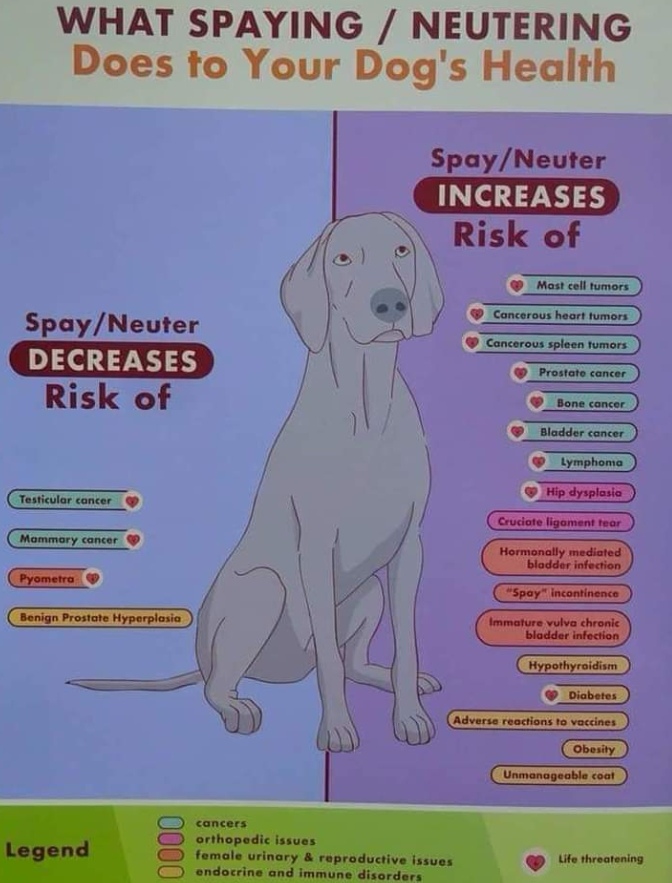
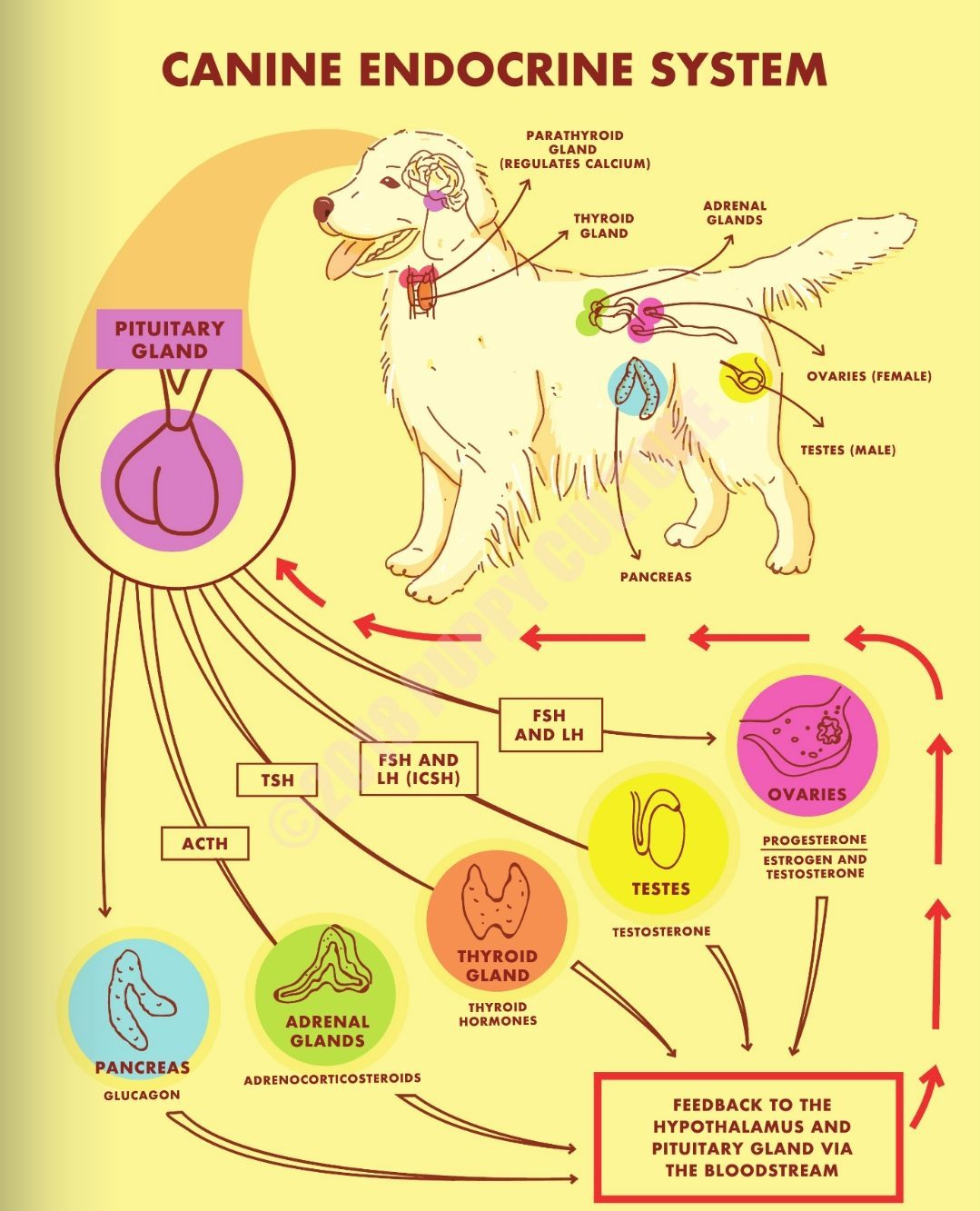
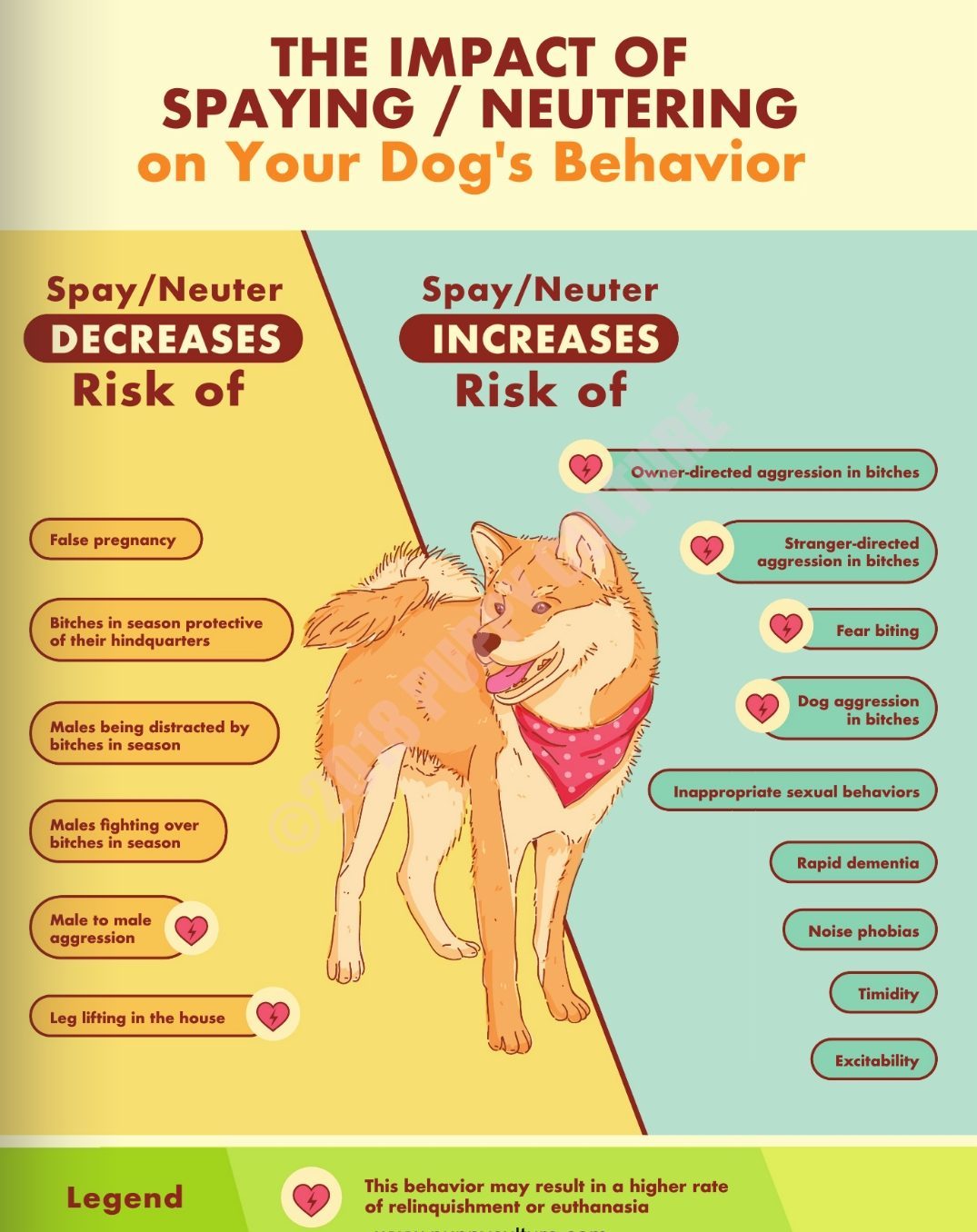
Recent Comments